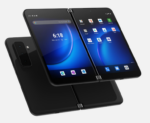The analogy is obvious: Android is to IBM PC as Apple is to, well, Apple. The battle for dominance in the smartphone market has been compared to the battle for the desktop in the 1980s, but at the Open Mobile Summit in San Francisco yesterday, that now-conventional wisdom was challenged.
Rod Hall, vice president at JP Morgan, spoke at the Summit on this very subject.
“One of the things people talk a lot about is the horizontal example of the PC in the 1980s. This battle was won based on a market that became very horizontally focused,” said Hall. “The main reason was because in those days we didn’t have an ecosystem of components. We didn’t have companies that made chips and hardware at scale. It was natural for market share to move very aggressively to very few people, and that benefited Microsoft and Intel.
“Dell did really well because they learned how to scale hardware production. That’s the model a lot of people are thinking about with Android. I am going to argue that this may not be the case.”
He said that the current battle between Android and iPhone is neither actually about the devices nor the operating systems. “The value of the network cedes to the value of the services platform,” said Hall. For this reason, he said, the battle between Apple and Google will likely not play out like the battle for the desktop.
He argued that the key to winning for Apple and Google is the proper exploitation of service platforms, such as Apple’s iTunes and Google’s Gmail. In this light, he said, companies like Motorola and Nokia aren’t competing at all, and companies like Microsoft and Research In Motion offer an array of loose services that they both have had trouble monetizing in phones.
Additionally, Hall showed figures from J.P. Morgan that showed smartphone penetration in the U.S. hovering between 20% and 30%. That, he said, indicates that the market for smartphones has only just now reached a critical mass, meaning that at this point, smartphones will start to become ubiquitous.
Hall said that he also sits on the advisory board of a company that develops Android software, and he admitted that despite growth in the market by Android, Apple remains dominant with a significant portion of new planned projects dedicated to iPhone.
“If we look at iOS project start numbers, they are more than 10x that of Android,” he said. “Even though Apple dominates in the number of applications on their platform today, the number of actual new applications being built every minute is more than 10x that of Android. That platform is continuing to maintain that strength going forward.”






